String of buttons scientifically known as Crassula perforate. People also call them necklace vine and pagoda plant. String of buttons is a native plant in South Africa.
They are enchanting succulent which would grow in a sprawling way. Further They will tend to stack on top of each other. This is uncommon among other succulents.
At the initial stage it looks like they grow straight upright. Over time, it could get a different posture.
When they grow with the weight of the leaves, the plant bends to the sides. So, when we let it grow in a hanging basket in a cascading way it will be a treat to watch it.
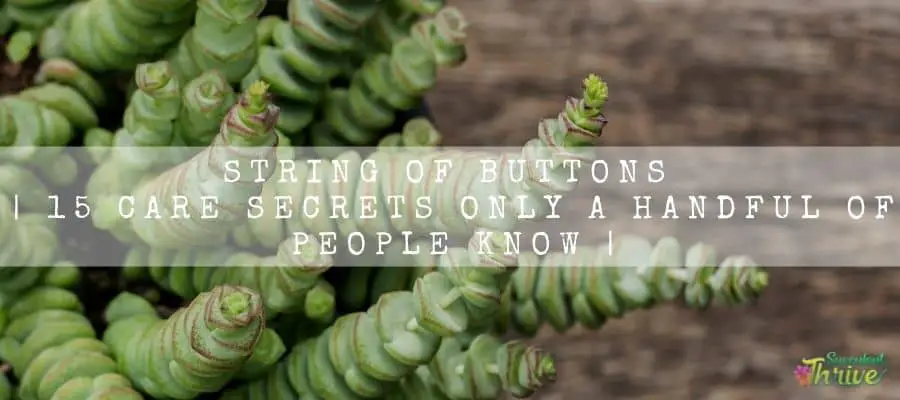
How do I identify a string of buttons?
String of button plants usually comprises leaves in triangular shape and they may look like spirals stacked on each other.
Their leaves are gray green and will further contain tiny pink or white tips of their leaves. Leaves will tend to grow in rosette manner.
If we provide them intense lightning, they will display pink shades on them. They will resemble tiny green pasta spirals when we look at them from afar.
When it is the springtime,you could easily identify them with their formation of small star shaped pink or yellow flowers. It does not carry any fragrance.
Size
String of button plants could only be approximately about 1‘– 2′ (30cm – 60cm) in height and about 2’– 3‘ (60cm – 90cm) in spread .
Growth
String of button succulent is usually known as a fast-growing plant. They will carry a firm root system once they grow. They will have stems spreading in an outward manner.
Moreover they will consist of a thick foliage which will be in a square shape. The foliage has a prominent look.
One look care guide
| Botanical Name | Crassula perforata |
| Common Name | String of buttons, necklace vine and pagoda plant |
| Plant Type | Succulent |
| Mature Size | about 1‘– 2′ (30cm – 60cm) in height and about 2’– 3‘ (60cm – 90cm) in spread |
| Sun Exposure | Full sunlight to partial sunlight |
| Soil Type | Well draining |
| Soil pH | Slightly acidic |
| Bloom Time | Spring |
| Flower Color | White, yellow |
| Hardiness Zones | USDA hardiness zone 9 to 11 |
| Native Area | Southern Africa |
| Toxicity | Non-toxic |
| Average price | 5 USD – 10 USD |
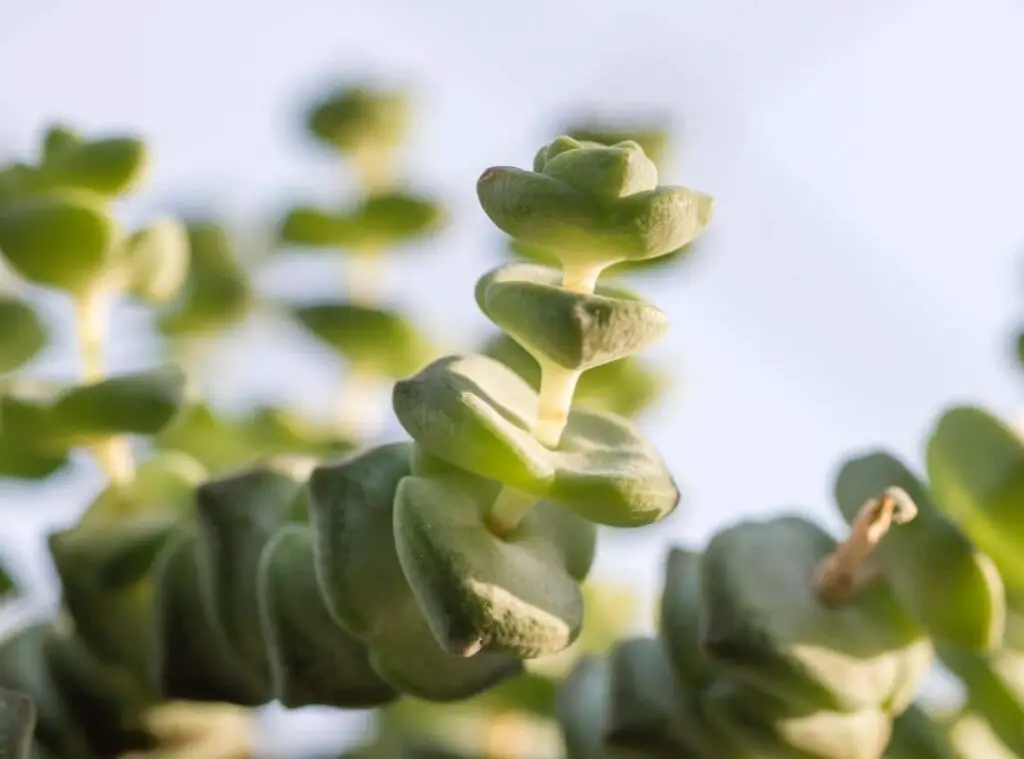
Care guide | 15 Facts |
Light Requirement
Crassula perforata is a native plant in South Africa, hence they could grow well in both full sunlight and in partial sunlight conditions.
String of button plants can tolerate any light condition when we grow them indoors.
If they lack adequate sunlight for prolonged periods, they will start to stress. When they run short of adequate sunlight, their foliage will discolor.
Hence place them at a location where they can grab plenty of indirect sunlight.
Temperature and humidity
In terms of temperature, this is not the type of the plant, which is very peculiar about temperature.
However they are not frost hardy (on extreme levels). Of course they can bear a mild frost condition if the soil is in completely dry condition.
Nevertheless, don’t take any chances with that. Furthermore you should relocate the plant indoors when the temperature starts to decrease to 0 degrees Celsius ( 32 degrees Fahrenheit ).
Best temperatures in the summer season should be (65ºF/18ºC – 70ºF/21ºC). In winter, the ideal temperature should be (50ºF/10ºC).
Colder temperatures could interrupt these plants’ growth. Further you need to give protection If you have grown your string of buttons plant outdoors and If it is experiencing intense heated conditions.
Is it cold hardy?
This is not a cold hardy plant. But they can withstand mild frost conditions.
USDA hardiness zone
String of button plants usually prefer to grow in USDA hardiness zone 9 to 11
Watering Requirement
String of buttons usually grow well in dry environments and they could stay healthy if we do not water them for some time, but not for a prolonged period of time.
Watering them on a moderate level would be beneficial for them especially during summer.
We need to adjust on watering depending on the amount of light the string of buttons the plant gets.
If we consider a plant which we have grown outdoors ,during summer we could water them every few days. Whereas If it is indoors,you should do watering biweekly.
Once a month watering would be enough for them during winter.
When you are watering a string of button plants, ensure that the top inches of the layer of the soil is completely dry and the water has drained away from the drainage holes.
If your plant is getting a proper level of watering, their leaves will be plump and fresh in looks. On the other hand, when your plant lacks enough watering, their leaves will look shriveled.
Just as with other succulents, if we over water a string of button plants, they will also tend to turn their leaves yellow and mushy.
Ultimately, the plant will start to drop its leaves. Chances are that string of button plants can perish when over watering gets severe.
When you see your plant has dropped its leaves, you should take the plant out and check its root system whether they are severely affected.
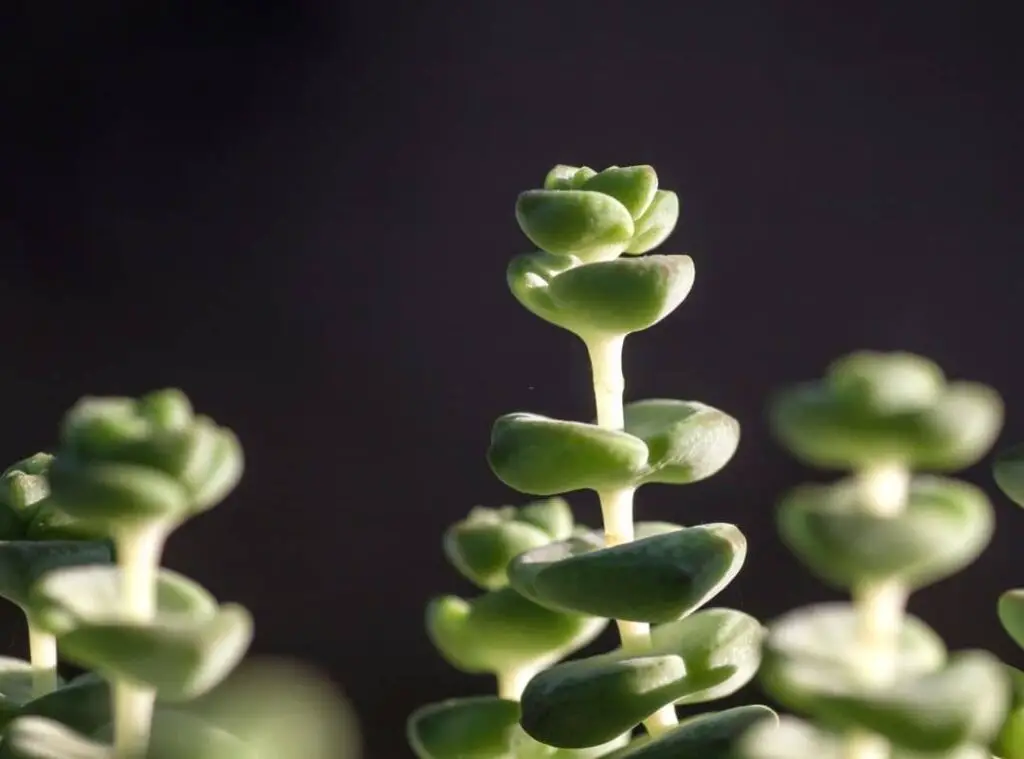
Soil Requirement Type / pH
One of the main requirements of Strings of buttons to grow well is well draining soil. That will help the water to move through and water will not retain in roots. Simultaneously , you should do watering moderately.
You may try using a cactus potting mix along with perlite for an efficient drainage.
Alternatively you could use sandy soil as well. You can make it by blending cactus mix or even the potting mix along with coarse sand.
They will do well in slightly acidic soil.
Flowering and Fragrance
String of buttons usually bloom with white and yellow tiny flowers. Further, they will form in clusters.
It will be pleasing to watch them in full blossom. However out of all these, there could be exceptions for certain strings of button plants as they will not bloom at all.
That will completely depend on the environmental conditions.
They do not have any fragrance. Their flowers will be about quarter inch and will be star shaped. Flowering of a string of buttons could take place in Spring.
Pot size Potting and Repotting
You should consider repotting them when you spot them outgrowing from the containers.
String of buttons tend to grow from a few inches annually. Hence, be mindful when you are selecting the appropriate pot.
We do not need to repot the string of buttons planted very often.
However if you wish to do it, you should conduct repotting only when they are in their dormant season and in heated conditions.
It will allow them to have sufficient space for them to grow when their growing season arrives.
In case you see any rotting roots during this process, you should cut them off. Afterwards, place them to get dry before planting it. Best is to change the new soil mix into a better draining
Where to Plant
String of button succulent is not a cold hardy plant. Consider that you live in an area where its temperatures drop to 20 degrees Fahrenheit or below, then you should plant them in pots or in containers which you could easily relocate indoors.
It usually thrives in full sunlight to partial sunlight. When you plant a string of buttons . make sure that it gets six hours of daily sunlight.
When you think of growing it indoors, just make sure that you place it near a bright sunny window so that the plant can get adequate sunlight.
Fertilizer and time of year
As you know, many succulents grow well despite whether we feed them or not. String of buttons is also the same.
Having said that, we can apply some fertilizers during their actively growing season. They would like that since they can absorb the necessary nutrients from the fertilizers. .
If you wish to add some fertilizers, you may use a common houseplant fertilizer.
It needs to be a diluted one with half a strength of water. You could fertilize them every other week.
Further you could also go for specific succulent fertilizers in the market. However, just make sure that you apply those only in their growing season.
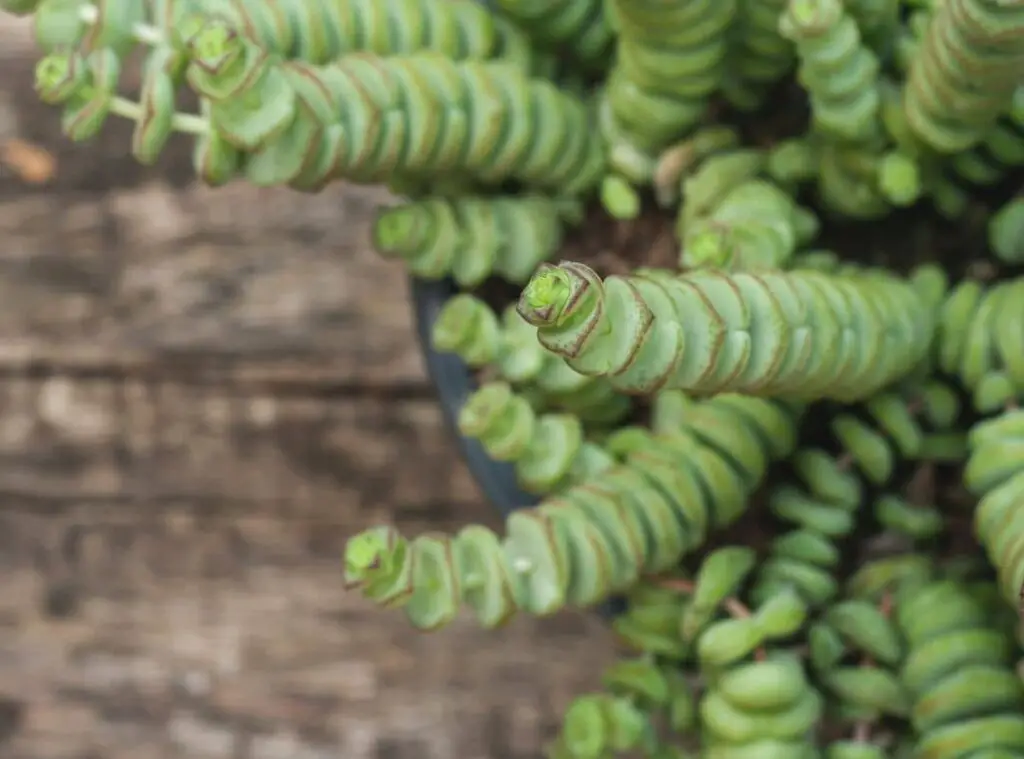
Dormancy
String of button plants are Summer dormant plants.
Other plants Pairs Well With
These succulents could make a great pair with Graptoveria “Candle Blue”
Can it be toxic to pets?
These plants are not generally toxic to humans and to domestic pets as well.
Read Next: Is Pencil Cactus Toxic? | 10 Interesting Facts About Toxic Pencil Cactus |
Common bugs and illnesses
Brown leaves are one of the main significant issues that these plants face. Sunburn causes these plants’ leaves to turn brown.
Further, Intense heat waves can also factor in sunburns. If we expose our plant for a longer period of sunburn, chances are that we could even end up losing the plant.
To avoid this happening, ensure that you give it protection from extreme heat conditions.
For example, you may move them to a shady place at home. Alternatively, you could place it under a taller tree.
Next issue would be the shriveled leaves of them. Main reason for this is underwatering. When your plants lack water, they will tend to be dry. You should immediately start watering whenever you spot this issue
Finally, over watering could cause the plant’s leaves to be mushy and turn brown in color. The plant may look unhealthy.
You should halt watering them as soon as you notice this. let it dry completely. If it takes too long to dry, consider changing the soil mix to a well draining one.
You should act immediately unless there will be root rot occurring too.
Special Care tips
String of succulent buttons would be very attractive for pollinators such as butterflies and for hummingbirds.
As such, make sure that you cut off the dead flowers as soon as they perish. Unless, it will harm the beauty of the plant.
How do you repot a string of buttons?
You should consider repotting them when you spot them outgrowing from the containers. String of buttons tend to grow from a few inches annually.
Hence, be mindful when you are selecting the appropriate pot.
You should conduct repotting only when they are in their dormant season and in heated conditions.
It will allow them to have sufficient space for them to grow when their growing season arrives.
In case you see any rotting roots during this process, you should cut them off. Afterwards, place them to get dry before planting it. Best is to change the new soil mix into a better draining soil mix.
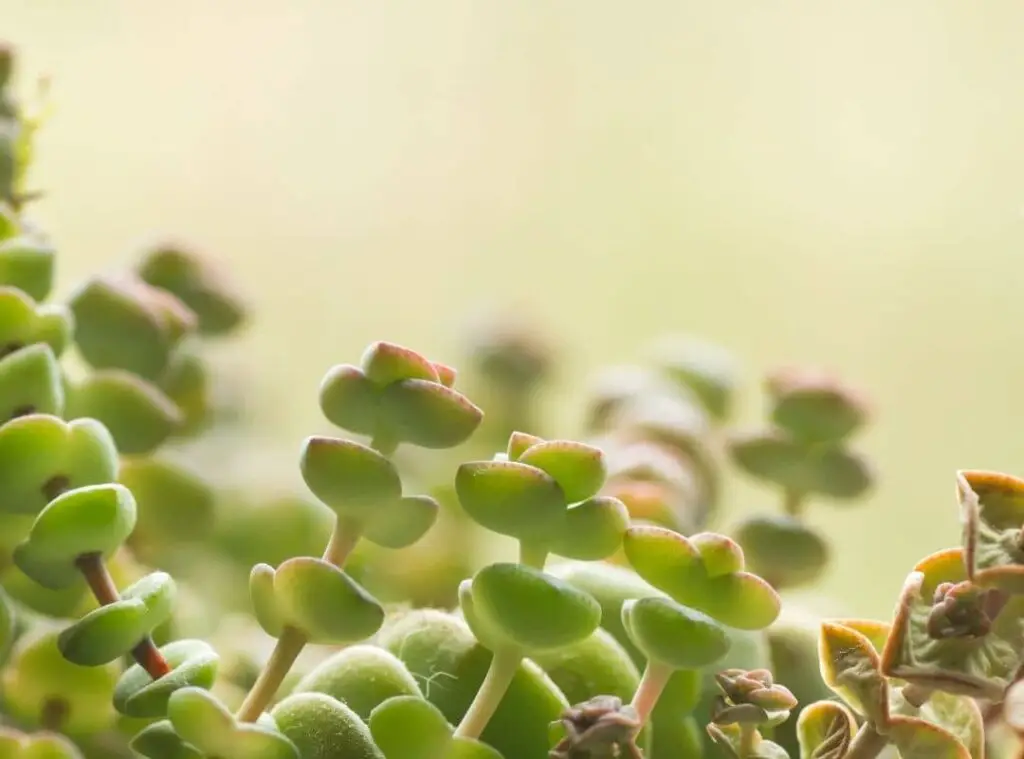
String of buttons plant benefits
Many people would love to add a string of button succulent to their garden due to the attractive looks they have.
It could be handy for hanging baskets. Moreover you can just let the plant spill over from a window or from a cute looking pot.
You may grow it in a garden bed or even in rock gardens if you are someone who lives in an area with heated conditions. They will be so pretty as when we grow them as ground covers.
Related question
Is a string of buttons an indoor plant?
We could grow this as an indoor plant. In fact this is a type of a plant, which we can plant anywhere be it outdoors or indoors.
However you need to ensure that you provide a proper soil mix for them. It should be a potting mix which has an excellent draining.
Let them gain adequate sunlight also so that they can do well.
Is string of buttons toxic?
These plants are not generally toxic to humans and to domestic pets also.
Do string of buttons need direct sunlight?
It is not mandatory to provide direct sunlight for these plants. String of buttons usually flourish in regions where it can grab adequate sunlight.
Having said that they can also survive in full sunlight to partial sunlight as well.
They would appreciate it more if we can give them filtered bright sunlight. Further We need to expose them for full sunlight gradually as if not leaves will burn very easily.
You need to ensure that you place them in a bright sunny location if you wish to grow it outdoors.
Can a string of buttons be rooted in water?
You could propagate these plants in water
Should I mist my string of buttons?
You could do Misting for the cuttings with water during the propagation of the string of button .
Conclusion
String of buttons tend to grow as a cluster of three or more. If you need to repot, ensure that you keep all of them together to maintain the complete graceful appearance it had.
They are famous for their aggressive growth hence you could call it a scrambling plant in terms of growth aspect.
Moreover their multiplication is also something very interesting which you could spot especially when you segregate them to propagate.
This is one beautiful plant who would love to grow either in cute looking containers or in hanging baskets.
Read More : Echeveria Lola Succulent Ultimate Care Guide | 15 Care Facts |
